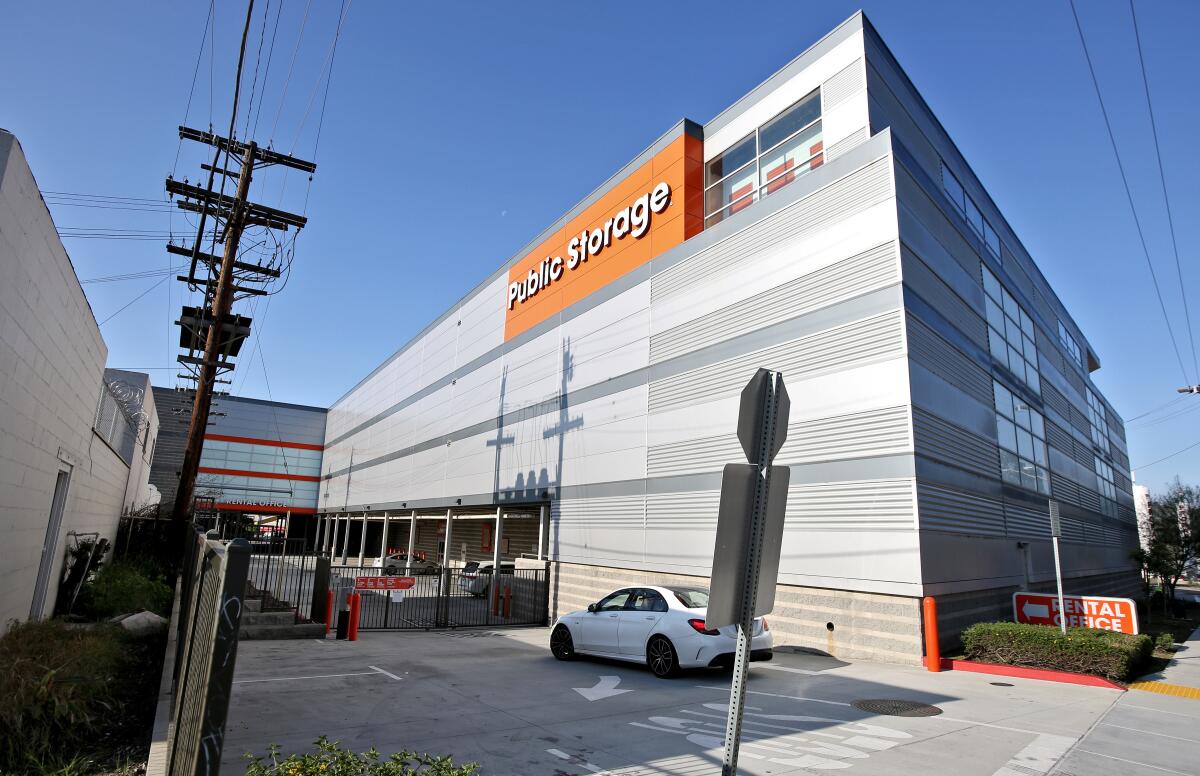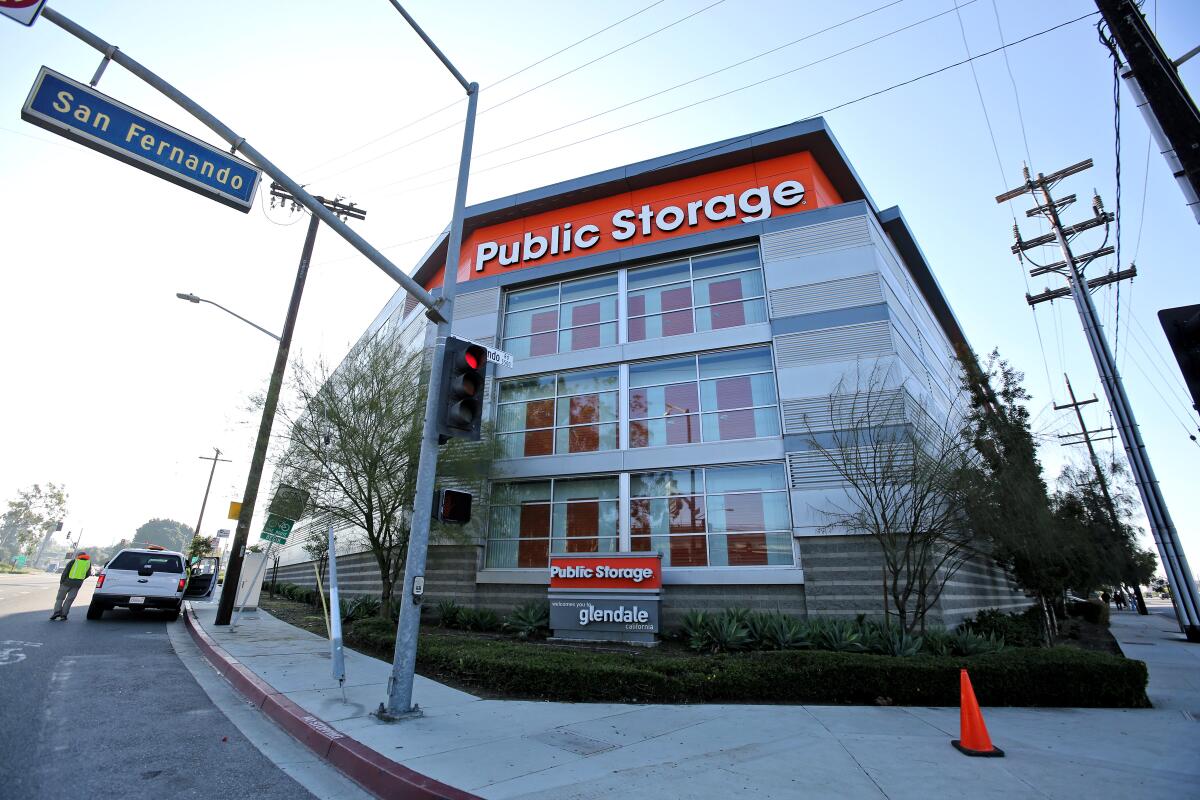Storage facilities are staying open during the pandemic. For some, it’s another rent they can’t pay.

- Share via
After flying back to her parent’s house in Washington state after two years abroad at the end of February, Kirsten Barrie hoped she would be able to retrieve her items from a storage facility in Glendale, where she used to live, and bring them back up north before figuring out her next move.
Then, state-by-state, the country started to shut down as cases of the deadly novel coronavirus began to spread rapidly. Residents in both Washington and California were ordered to stay at home except for essential needs in late March.
But come April 1, a $1,200 bill for Barrie’s Public Storage unit was still due. The sum included March and April’s rent — at $500 a month — in addition to late fees. Another fee was slapped on for paying the entire amount a few days after the first of the month.
Amid forced closures of nonessential businesses across California, storage facilities have stayed open.
Some people moving in with relatives or downsizing their living space to save money amid the public-health-turned economic crisis are leasing space in storage facilities to store belongings they can’t bring with them, said McKall Morris, a spokeswoman with Extra Space Storage.
Others, like Barrie, are trying to get out.
“If I can’t get this resolved. I will mostly likely have to fly to L.A. and put myself in danger. And hire movers and put them in danger. I don’t want to do that,” Barrie said, referring to city orders to stay at home as much as possible to avoid spreading the virus that has claimed four lives in Glendale and at least 402 throughout Los Angeles County.
Felipe Gomez, a Public Storage district manager, said in an email to Barrie on March 18 that there was nothing the company could do to help.
“I’m very sorry to hear your plans were interrupted due to the coronavirus,” Gomez wrote. “To answer your question, as of today, Public Storage is not offering any rent relief.”
Evictions and rent increases at Public Storage facilities in L.A. County have been halted through the end of May, company spokesperson Paul Rose said. Headquartered in Glendale, Public Storage operates facilities across the country.
Meanwhile, Extra Space Storage, another national company, has halted evictions and rent increases, and is “empowering managers be as lenient as they want to be,” with rent, including offering repayment plans and cutting late fees, according to Morris.
She said the company recently offered a discounted unit to a Southern California couple who had lost their jobs as hotel workers and had to leave their house and move into a spare room.
It’s unclear to what extent eviction and rent increase moratoriums recently implemented in Glendale — intended to help tenants who might have been negatively financially impacted by the coronavirus — apply to local storage facilities.
In Glendale, city officials have halted evictions of both commercial and residential tenants, and have given tenants a year following the end of the emergency period — currently set to expire April 30 — to pay back missed or late rent. The halt on rent increases applies to residential units only.
A judge would likely have to make the call if the orders apply to storage facilities, according to Lucy Varpetian, an attorney with the city of Glendale. It was an assessment seconded by City Councilman Ara Najarian, who is an attorney.
An individual could, for example, use Glendale’s orders as a defense against eviction from their storage space if the matter was brought to court, Varpetian said.
Under the California Civil Code, Varpetian said storage didn’t seem to be treated as traditional residential or commercial use. Unlike an apartment, where a landlord would need to go through a lengthy legal process to change the locks, storage facility operators can do so if a tenant is issued a lien and doesn’t pay.
“Less and less does it look like the extension of a residence and more and more like a contract arrangement between two parties looking to utilize some space,” Varpetian said.

In May of 2018, Barrie put most of her belongings in a Glendale storage unit before packing up and leaving the country.
Her partner is in the U.S. Army, and she most recently flew home from where he was stationed in South Korea to take care of a few loose ends, including getting her belongings into a cheaper and smaller space.
When she left Asia about a month and a half ago, the pandemic still hadn’t hit the United States in full force. Barrie, who runs a company that provides accounting help for small businesses, lost most of her customers when it finally did.
Like millions of people across the country, she is suddenly struggling to make ends meet. Her plans to return to her partner in South Korea, who is now on lockdown on the base there, have been put on indefinite hold.
“We understand a number of our customers in L.A. County may be facing economic hardships relating to this pandemic, and are working with those who cannot provide full payment,” Rose wrote in an April 13 email.
In early April, Barrie received a pre-lien threatening to lock her out of her Public Storage space if she didn’t pay by April 3.
According to Barrie, she was told by a Public Storage employee that if she paid her balance in full, she could ask the company to match the price of her unit to the lower rate being offered now for similar units.
After settling her debt, she was told by a different Public Storage employee, who was higher up on the corporate ladder, that price matching wasn’t possible.
Currently biding her time in a hotel-turned-short-term-apartment in Arizona, after having to leave her parent’s house, Barrie said she would likely make the drive over to L.A. before May 1 comes around and she’s on the hook for another $500.
The plan is to transfer her items to a smaller pod-type storage space that runs for less than half of what she pays now per month. Several of the items she’s transferring are furniture, and she anticipates needing to hire help to move the bulky items.
After that, she has no definite plan.
